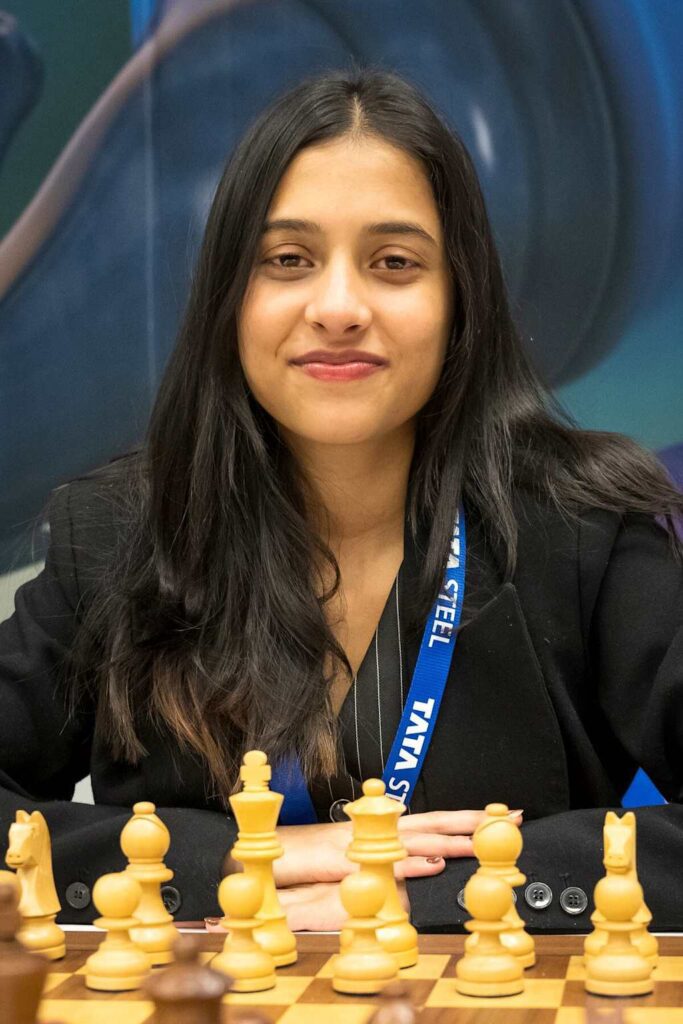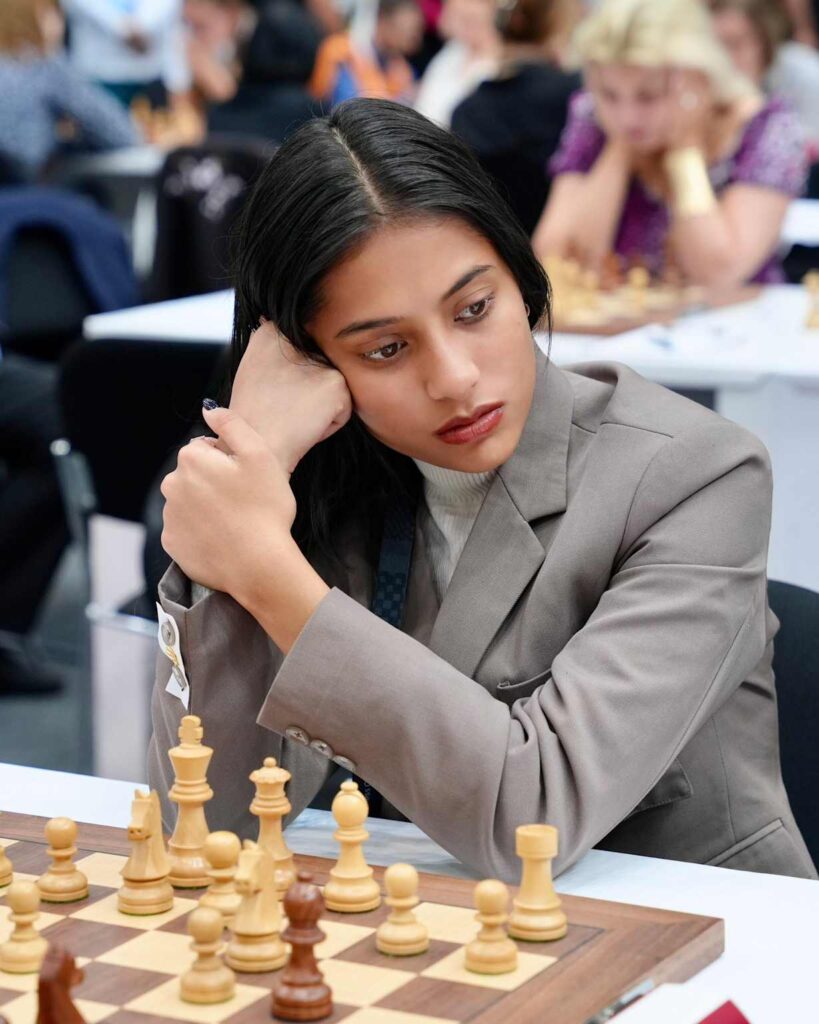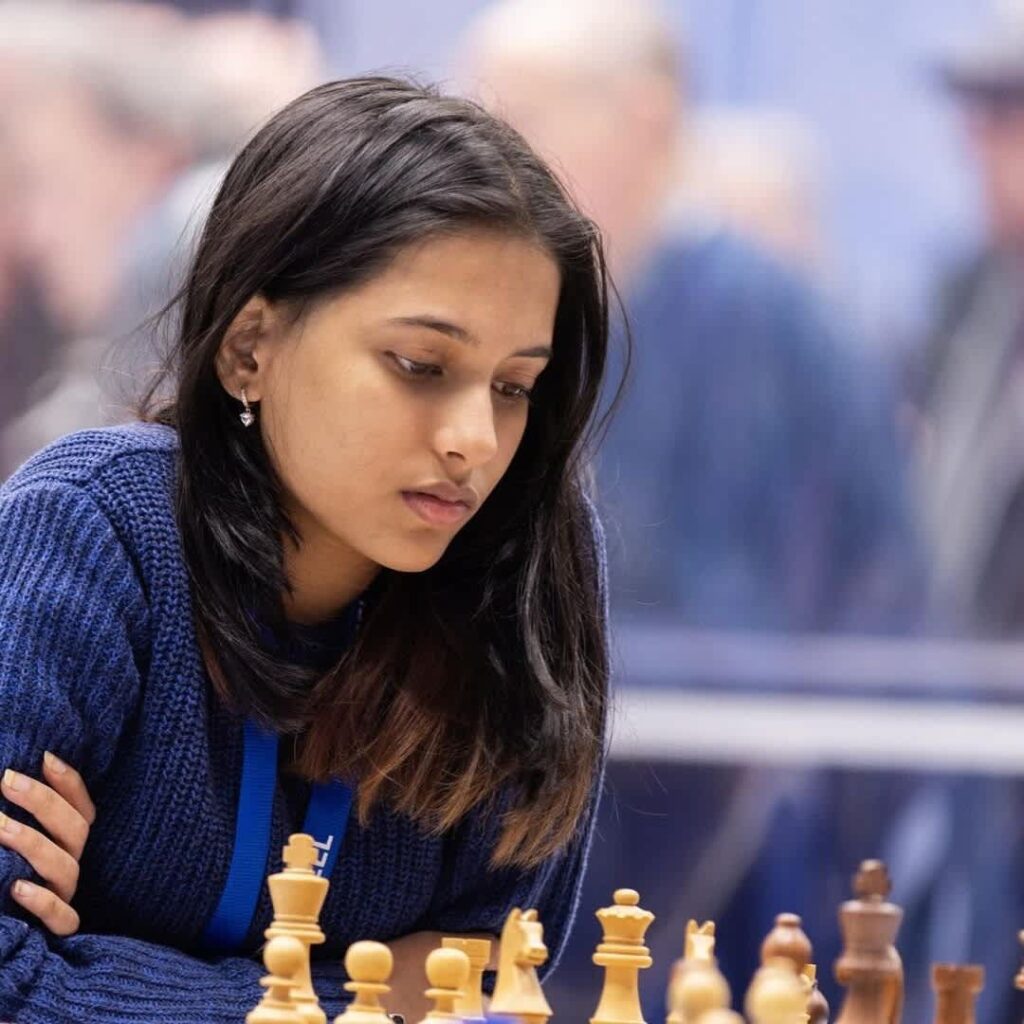
Divya Deshmukh has emerged as one of India’s most promising chess prodigies, capturing global attention with her exceptional performances and fearless playing style. At just 19 years old, this Woman Grandmaster from Nagpur has already etched her name in chess history by becoming the first Indian woman to reach the FIDE Women’s World Cup final in 2025. Her meteoric rise from a curious five-year-old learning chess to India’s second-ranked female player represents a remarkable journey of talent, dedication, and breaking new ground for Indian women’s chess.
Indian female chess player concentrating on a chess game during a tournament
Early Life and Family Background: A Foundation Built on Excellence
Born on December 9, 2005, in Nagpur, Maharashtra, Divya Deshmukh comes from a family of distinguished medical professionals. Her parents, Dr. Jitendra Deshmukh and Dr. Namrata Deshmukh, are both gynecologists who have provided unwavering support throughout her chess journey. Dr. Jitendra serves as a professor and head at Government Medical College, Gondia, while Dr. Namrata has been instrumental in managing Divya’s tournament schedule and training.
The chess connection in the Deshmukh family runs deeper than expected. Dr. Namrata’s grandfather had a unique chess tradition of challenging the renowned revolutionary Vinoba Bhave to connection to chess created a familial appreciation for the game that would later prove pivotal in Divya’s development.
Divya’s introduction to chess was somewhat serendipitous. Initially enrolled in badminton classes alongside her elder sister Arya, five-year-old Divya was deemed too short to reach the badminton net. When her parents noticed a chess class in the same building, they decided to try it as an alternative. What began as a practical solution became a life-changing decision that would reshape Indian chess history.
Chess Education and Early Development: The Nagpur-Chennai Connection
Divya’s formal chess education began at age six under the guidance of local coach Rahul Joshi in Nagpur. Joshi was instrumental in building her foundational interest in the sport and encouraging her participation in early tournaments. Her chess education progressed through Bhavans Bhagwandas Purohit Vidya Mandir in Nagpur, where she successfully balanced academics with her growing chess commitments.
A pivotal moment in her development came when she began training under Grandmaster RB Ramesh at the prestigious Chess Gurukul in Chennai. This monthly training regimen, where Divya would spend 7–10 days each month in Chennai, provided her with world-class coaching and exposure to advanced chess concepts. Ramesh, who quit his lucrative job with Indian Oil Corporation to become a full-time coach, recognized Divya’s exceptional potential early on.
GM RB Ramesh’s training methodology at Chess Gurukul includes not just advanced chess instruction but also meditation and mental conditioning. His academy has produced numerous Indian chess stars, including R. Praggnanandhaa, R. Vaishali, and Aravindh Chithambaram. Ramesh’s assessment of Divya highlighted her mental strength and tactical creativity as her standout qualities.
Divya Deshmukh concentrating during a chess tournament, showcasing focus and strategic thinking
Breakthrough Achievements: Building a Championship Legacy
Junior World Championships and Early Success
Divya’s competitive journey began with immediate success. She won the Under‑7 National Championship in 2012 at age seven, marking the beginning of an extraordinary competitive career. Her international breakthrough came with victories in the World Youth Championships in the Under-10 category (Durban, 2014) and Under-12 category (Brazil, 2017).
The World Cadet Chess Championship victory in Brazil in 2017 was particularly significant, as it gave India its only medal at that prestigious tournament. Divya scored 9.5 points out of 9 games, demonstrating the commanding performances that would become her trademark. This victory also earned her recognition as the youngest Woman FIDE Master in 2013.
Title Progressions and Rating Milestones
Divya’s title progression followed a rapid trajectory that reflected her exceptional development:
- Woman FIDE Master (WFM): 2013 — Youngest in Indian history at the time
- Woman International Master (WIM): 2018 — Achieved at age 12
- Woman Grandmaster (WGM): 2021 — India’s 21st, becoming the first from Vidarbha region
- International Master (IM): 2023 — Acquired her third IM norm
Her rating progression has been equally impressive. Starting from junior levels, Divya crossed the crucial 2200 Elo mark in March 2018, becoming the youngest female player globally to achieve this milestone at that time. By 2024, she had achieved a peak rating of 2501, placing her in the world’s top 15 female players.
Divya Deshmukh, Indian chess player, at a Tata Steel chess event with chess pieces in front of her
Major Tournament Victories: Establishing International Dominance

2022: National Champion and Olympic Bronze
2022 marked a breakthrough year for Divya with her victory in the Women’s Indian Chess Championship, becoming the first senior national women’s chess champion from Nagpur. This victory made her only the second teenager after Koneru Humpy to win the title. She also earned an individual bronze medal at the 2022 Chess Olympiad while being part of India’s successful campaign.
2023: Asian Champion and Tata Steel Triumph
Divya’s 2023 Asian Women’s Chess Championship victory in Almaty established her as a continental champion. Even more impressive was her stunning performance at the Tata Steel India Chess Tournament, where she won the women’s rapid section despite being the lowest seed. During this tournament, she defeated established stars including Harika Dronavalli, Koneru Humpy, Vantika Agrawal, and drew against Women’s World Champion Ju Wenjun.
2024: World Junior Champion and Olympic Gold
2024 proved to be Divya’s most successful year to date. In June, she captured the FIDE World U20 Girls Championship in Gandhinagar, Gujarat, with a commanding score of 10 points out of 11 rounds. This victory made her the fourth Indian woman to win this prestigious title, following Koneru Humpy (2001), Harika Dronavalli (2008), and Soumya Swaminathan (2009).
Her crowning achievement of 2024 came at the 45th Chess Olympiad in Budapest, where she played a crucial role in India’s historic double gold medal victory. Competing on Board 3, Divya scored 9.5 points out of 11 games with a performance rating of 2608, earning both team and individual gold medals. This performance marked her debut in the main Indian team and demonstrated her ability to perform under the highest pressure.
Young female chess player competing in a tournament, representing Divya Deshmukh’s profile as an emerging Indian chess talent
2025: Historic World Cup Final and Global Recognition
FIDE Women’s World Cup 2025: Breaking New Ground
Divya’s participation in the 2025 FIDE Women’s World Cup in Batumi, Georgia, represents the pinnacle of her career achievements so far. As the 16th seed, she embarked on a remarkable journey that saw her become the first Indian woman to reach the final of this prestigious tournament.
Her path to the final included several stunning victories over higher-ranked opponents:
- Defeated Zhu Jiner (World No. 6 from China) in earlier rounds
- Defeated compatriot GM Harika Dronavalli in the quarterfinals
- Defeated former World Champion Tan Zhongyi (China) in the semifinals with a 1.5–0.5 victory
The semifinal victory against Tan Zhongyi was particularly memorable, featuring a marathon 101-move game in the second encounter where Divya demonstrated exceptional endurance and tactical precision. This victory secured her qualification for the 2026 Women’s Candidates Tournament and guaranteed her first Grandmaster norm.
All-Indian Final: Historic Showdown
The 2025 Women’s World Cup final created history by featuring an all-Indian showdown between Divya and veteran Koneru Humpy. This marked the first time two Indian players reached the final of this tournament, highlighting India’s emergence as a dominant force in women’s chess. The final format consisted of two classical games, with the first game ending in a hard-fought draw despite Divya having a significant advantage in the opening phase.
Divya Deshmukh at a chess tournament with the Tata Steel lanyard, ready to play a match
World Team Championships: Defeating the World No. 1

Divya Deshmukh
Earlier in 2025, Divya made headlines at the World Rapid and Blitz Team Championships in London by achieving one of the most significant victories of her career — defeating World No. 1 Hou Yifan in a thrilling 74-move blitz semifinal. This victory helped her team, Hexamind Chess Club, secure silver in the rapid event and bronze in the blitz competition, while Divya posted an impressive performance rating of 2606 in the blitz segment.
Playing Style and Tactical Approach: Aggressive Excellence
Aggressive Tactical Philosophy
Divya’s playing style has been consistently characterized by chess experts as aggressive and tactical. Grandmaster Srinath Narayanan describes her as “aggressive and tactical in style” while noting that “although she has become more versatile in recent times, by default, she’s more aggressive and tactical”. This contrasts with more positional players who focus on long-term strategic building.
Viswanathan Anand has praised Divya’s attacking chess, noting that “she does lean towards aggressive chess,” which aligns with current trends in women’s chess. Her games are characterized by:
- Bold opening preparation and willingness to deviate from standard theory
- Sharp tactical complications that put pressure on opponents
- Excellent endgame technique despite her young age
- Mental resilience under time pressure
Opening Repertoire and Preparation
According to chess databases, Divya’s opening repertoire shows versatility with both 1.d4 and 1.e4 as White. Her main openings include:
With White pieces:
- Queen’s Pawn Game (A45, D02) — 25 games recorded
- Four Knights Spanish Variation (C48) — 9 games
- Robatsch/Modern Defense (B06) — 7 games
With Black pieces:
- Queen’s Gambit Declined (D37) — 11 games
- French Defense (C11) — 9 games
- Sicilian Defense (B30) — 9 games
- King’s Indian Attack/Barcza System (A07) — 9 games
Young female chess player making a move during a competitive match
Current FIDE Ratings and Global Standing
As of July 2025, Divya’s FIDE ratings reflect her world-class status across all time controls:
- Standard Rating: 2463 (World Rank #18 among women, India Rank #4)
- Rapid Rating: 2395 (World Rank #22 among women)
- Blitz Rating: 2388 (World Rank #18 among women)
- Peak Rating: 2501 (October 2024, achieved at age 18)
These ratings place her among the world’s top 20 female chess players and demonstrate consistent improvement across all formats. Her 70-point rating gain in 2024 was among the highest improvements by any Indian player that year, comparable to gains made by World Champion Gukesh and top Indian Grandmasters.
Social Impact and Advocacy: Addressing Chess Sexism
Standing Against Gender Discrimination
In early 2024, Divya courageously addressed the issue of sexism in chess through a powerful social media post following her participation in the Tata Steel Chess Tournament in the Netherlands. Her Instagram post highlighted how female chess players often face inappropriate focus on their appearance rather than their chess skills.
“It’s a sad truth that when women play chess, [people] often overlook how good they actually are… and every irrelevant thing is focused on,” she wrote, describing how audiences commented on her “clothes, hair, accent and every other irrelevant thing” instead of her games.
Impact on Women’s Chess Discourse
Divya’s advocacy for gender equality in chess sparked important conversations within the chess community. The Tata Steel Chess organizers publicly supported her stance, stating they “remain committed to promoting women in chess and ensuring a safe and equal sporting environment”. Her courage in addressing these issues at just 18 years old demonstrated maturity beyond her years and helped bring attention to systemic problems facing female chess players globally.
Chess experts and journalists praised her for raising awareness about the challenges faced by women in chess, particularly regarding online harassment and inappropriate commentary during live tournaments and streaming events. Her advocacy has contributed to broader discussions about creating safer, more respectful environments for female chess players at all levels.
Training Methodology and Professional Development
Chess Gurukul Training Regimen
Under GM RB Ramesh’s guidance at Chess Gurukul, Divya follows a comprehensive training program that extends beyond pure chess instruction. The academy’s methodology includes:
- Advanced tactical and positional training with computer analysis
- Opening preparation tailored to her aggressive style
- Endgame studies to improve technical precision
- Meditation and mental conditioning to handle tournament pressure
- Physical fitness components to maintain stamina during long games
Ramesh, who received the FIDE Mark Dvoretsky Award for best trainer of juniors in 2019, has produced over 45 gold medals in world events through his students. His personalized approach to coaching has been crucial in developing Divya’s natural talent into world-class performance capability.
International Exposure and Tournament Strategy
Divya’s development has been accelerated through extensive international tournament exposure. Her schedule typically includes:
- European tournament circuits for rating improvement and GM norms
- Asian Championships and continental competitions
- Women’s Grand Prix events for elite-level experience
- Team competitions including Olympiads and World Team Championships
This exposure strategy, recommended by Coach Ramesh, has been essential for her rapid rating improvement and adaptation to different playing styles globally.
Two female chess players engaged in a competitive game, representing high-level women’s chess tournament play
Impact on Indian Chess Development

Inspiring the Next Generation
Divya’s success has had a significant inspirational impact on young chess players, particularly girls, across India. Her achievements demonstrate that with proper support and dedication, Indian players can compete successfully at the highest levels of world chess. Her story from a Nagpur chess academy to world finals has encouraged many families to support their daughters’ chess ambitions.
Contribution to India’s Chess Golden Age
Divya is part of India’s remarkable chess golden generation that has transformed the country into a global chess powerhouse. Alongside players like Gukesh, Praggnanandhaa, Arjun Erigaisi, and R. Vaishali, she represents the new wave of Indian chess talent that consistently competes for the highest honors in international competitions.
Her achievements have contributed to India’s rise in both individual and team chess competitions:
- Double gold at 2024 Chess Olympiad (both men’s and women’s teams)
- Multiple individual gold medals at international team events
- Consistent representation in World Championship qualification events
- Rising FIDE ratings across the Indian chess player pool
Future Prospects and Championship Ambitions
2026 Candidates Tournament Qualification
Divya’s qualification for the 2026 Women’s Candidates Tournament through her World Cup final appearance represents the biggest opportunity of her career so far. The Candidates Tournament determines the challenger for the Women’s World Championship, making her just one step away from competing for the highest title in women’s chess.
At 19 years old, she would be among the youngest players ever to compete in a Women’s Candidates Tournament, highlighting her accelerated development timeline. Her aggressive playing style and improving technical skills make her a formidable candidate for future world championship challenges.
Grandmaster Title Pursuit
While already holding the Woman Grandmaster title, Divya is actively pursuing the full Grandmaster title, which requires three GM norms and a rating of 2500+. Her World Cup performance has secured her first GM norm, and with her peak rating of 2501 already achieved, she is well-positioned to complete the remaining requirements in upcoming tournaments.
Achieving the full GM title would make her only the fourth Indian woman to accomplish this feat, following Koneru Humpy, Harika Dronavalli, and R. Vaishali.
Indian woman chess player focused during a chess match with wooden chess pieces on the board
Conclusion: A Chess Legend in the Making
Divya Deshmukh’s journey from a five-year-old learning chess in Nagpur to becoming India’s most promising chess talent represents one of the most remarkable rise stories in contemporary chess. Her combination of natural talent, dedicated training, family support, and fearless competitive spirit has created a player capable of competing with the world’s best at just 19 years old.
Her historic achievements — including the Asian Women’s Championship, World Junior Championship, Chess Olympiad gold medals, World Cup final appearance, and victories over world champions — establish her as a generational talent who is redefining what’s possible for Indian women’s chess. Beyond her competitive success, her advocacy for gender equality in chess demonstrates leadership qualities that extend far beyond the chessboard.
As she prepares for the 2026 Women’s Candidates Tournament and continues her pursuit of the Grandmaster title, Divya Deshmukh stands at the threshold of even greater achievements. Her story continues to inspire countless young chess enthusiasts while contributing to India’s emergence as the world’s leading chess nation. With her aggressive playing style, exceptional tournament results, and unwavering determination, Divya Deshmukh is not just India’s chess future — she is chess history in the making.
The chess world watches with anticipation as this Nagpur prodigy continues her quest to reach the absolute pinnacle of women’s chess, carrying with her the hopes and dreams of a nation that has discovered its chess destiny through players like her.

Leave a Reply